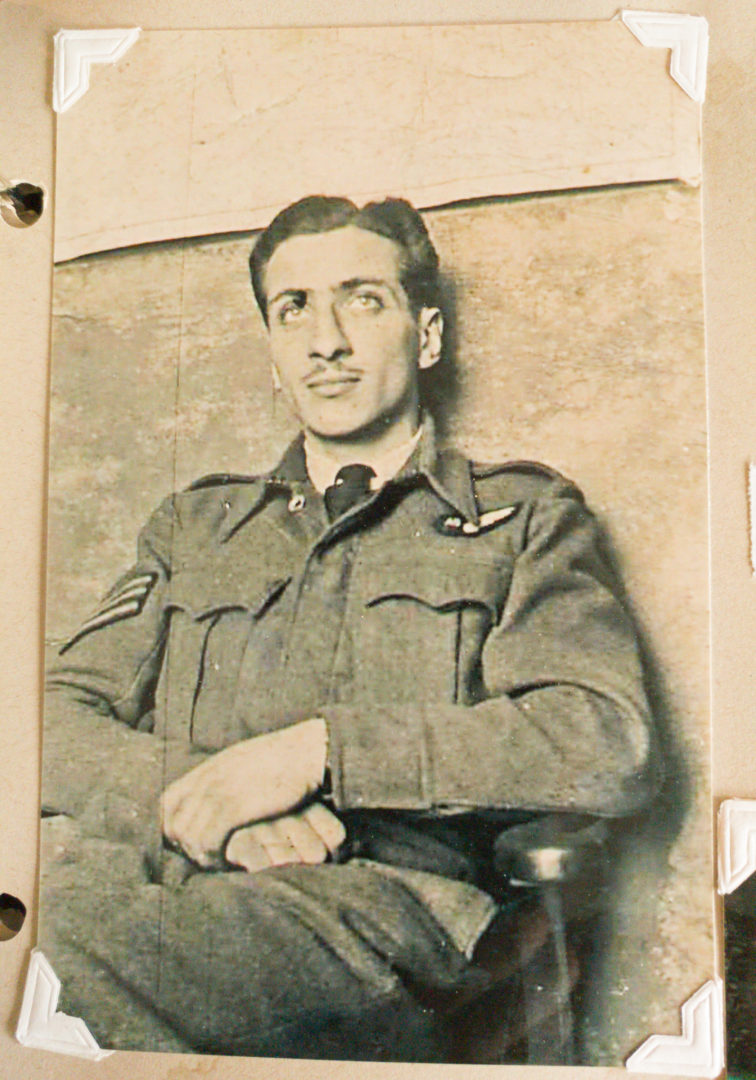During the Second World War, many Jewish soldiers fighting in the Canadian Armed Forces removed any indication of their religious identity from their dog tags. In the event they were captured, doing so would allow them to avoid the Nazis’ special treatment meted out to Jewish servicemen.
In the case of Flying Officer Sydney Brown, however, there was an unexpected consequence to his actions. Brown, a native of North Bay, Ont., was a “bomb airman” in a twin-engine Wellington medium bomber during the war. On the night of April 15, 1943, during his 27th mission, his crew had completed a mission over Stuttgart, Germany, and were heading home, when a German night fighter caught them off guard and disabled the plane.
Brown was at the back of the plane, assisting J.A. Simpson, the gunner in the tail turret, who had been wounded, and it’s believed he didn’t hear the order to bail out. Brown and Simpson went down with the plane in a farmer’s field south of Mesnil-St. Laurent.
Their bodies were found by German soldiers and, unaware that Brown was a Jew, he was buried in the town’s churchyard under a German cross, likely as a show of respect.

After the war, Brown’s family learned of the situation and with the help of the Canadian War Graves Commission, had the cross removed and replaced with a headstone engraved with a Star of David.
The body remains at rest, however, in a Christian cemetery. Every year, as Canadians remember the sacrifices of our servicemen and women, so too does Harvey Freeman, Brown’s cousin.
Although he was too young to enlist at the time, Freeman remembers his older cousins, who like thousands of Jews of the day, volunteered to serve in the Canadian Armed Forces.
The local townspeople respect the sacrifice of the Canadian airmen, Freeman said. Every year around the anniversary of Victory in Europe Day, which falls in early May, the townspeople hold a memorial service for the two Canadians who are buried there.
For Freeman’s family, military service is not an unusual tradition. His grandfather served for 13 years in the Austro-Hungarian army, before immigrating to Canada. His uncle, Lou Krugel, served in the Canadian artillery during the First World War and, during the Second World War, seven of his cousins were members of either the Canadian or American armed forces. Another relative served in the Red Army. Closer to home, Freeman’s daughter, Tamar, served in Afghanistan as a field medic with the Canadian Armed Forces.
For his part, Freeman was a member of the Canadian militia and held the distinction of being the only Canadian Jewish bagpiper in the army.
READ: VETS RECALL TRAUMA OF YOM KIPPUR WAR
“We’re a military family,” he said, somewhat understating the connection.
Sydney Brown’s brother, Zave Brown, was also killed while serving in the Canadian Army during the Second World War. A member of the Royal Hamilton Light Infantry, he was badly injured in Holland, 56 days before the war ended and succumbed to his wounds. He is buried in the Groesbeek Canadian War Cemetery in the Netherlands.
The family took the losses very hard. “My aunt and uncle (Leah and Abraham Brown) had a picture of both boys on the wall, but no one was allowed to speak about them,” he recalled.
Zave Brown was only 19 when he was killed; Sydney Brown was 24. The two are now buried about 300 km apart.
“I knew them both. Zave was only two years older than me. We spent our summers together,” Freeman said.
Freeman has traveled to Europe to visit their graves, as well as those of thousands of other Canadians who made the ultimate sacrifice to defeat the Nazis.
“Every couple of miles, there are cemeteries with hundreds of graves,” he said.
Europeans, who suffered under the Nazi boot, honour the dead annually, with bus loads of children brought to memorial services in the cemeteries, Freeman said.
On Remembrance Day in Toronto, his shul, Darchei Noam, also hosts a memorial service for the fallen. But unlike the youngsters in Europe, for whom the war has greater currency, in Canada, “it’s become a forgotten thing already. Young people have little connection to it,” he said.
Altogether, 1.1 million Canadians served in the Canadian Army, Royal Canadian Navy, Royal Canadian Air Force and in forces throughout the Commonwealth. Of those, 44,000 were killed.
Nearly 19,000 Jews enlisted in the Canadian Armed Forces, out of a total Jewish population at the time of approximately 167,000. An estimated 38 per cent of Canadian Jewish males 21 years of age and older served in the armed forces. More than 420 were killed. They are buried in 125 cemeteries throughout Europe, including one at rest in a Christian churchyard.







